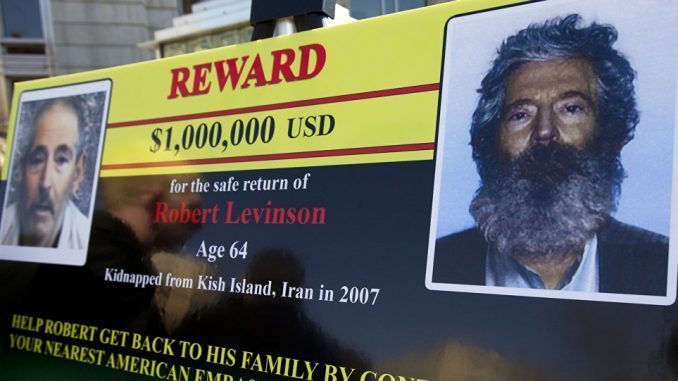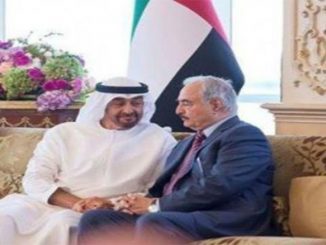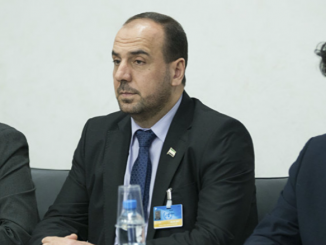
Both the FBI and the White House marked the 10th anniversary on Thursday of the disappearance of American Robert Levinson in Iran with a pledge to bring him back to the United States, a mission that Trump vowed to fulfill many times.
Trump has said during his election campaign that Iran’s nuclear deal as “disastrous” and said it would be his “number one priority” to dismantle it.
These threats became clearer after Trump’s inauguration, as he signed an executive order temporarily barring thousands from seven countries in the Middle East and Africa, including Iran, from obtaining visas to travel to the United States.
The tension was raised again in issues related to Iran’s ballistic program, as he said that “Iran is playing with fire” and announced that “we’re officially putting Iran on notice,” after Iran conducted a failed ballistic missile test.
In addition, Trump declared in January applying sanctions on 25 individuals and companies connected to Iran’s ballistic missile program and those providing support to Iran’s Islamic Revolutionary Guard Corps’ Quds Force.
Recently, US senators said plan to impose new sanctions on Iran over its ballistic missile program, while Israel and Saudi Arabia backed these measures and described Iran as the main sponsor of global “terrorism” and a destabilizing force in the Middle East.
All of these incidents raised the tension between the two countries to high levels, while both of them traded threatening declarations and conducted naval drills as shows of power.
However, the 10th anniversary of Robert Levinson’s case came in a bad time as Trump has made before a priority and may lead to more tension between the two countries.
Levinson’s disappearance
Levinson, who turns 69 Friday, was working as a private investigator in 2007 when he disappeared. Levinson, a Florida native, had been a 28-year veteran of the Drug Enforcement Administration and the FBI, with vast experience of Russian crime networks but little experience with Iran, before retiring to work privately. Originally, the State Department said that he had been traveling to Kish, an Iranian resort island and free-trade zone, to set up an interview for a project involving a book and a documentary, when he disappeared March 9, 2007.
It was only years later that more details about Levinson’s work at the time of his trip to Kish became publicly known. In 2013, the Associated Press revealed that Levinson had been working on an unapproved intelligence mission for the CIA. The private investigator had been hoping to recruit a source who could give details of alleged corruption among Iranian elites, the New York Times later reported, in an apparent bid to renew his contract with the agency.
Levinson’s family received a proof-of-life video in 2010 that they released publicly the next year. The 57-second video showed an emotional and gaunt Levinson pleading for U.S. authorities to help, but offered few clues about who was holding him or why. “Please help me get home,” Levinson, wearing an orange jumpsuit, says in the video.

Trump’s vows
White House press secretary Sean Spicer said that “The Trump Administration remains unwavering in our commitment to locate Mr. Levinson and bring him home. We want him back, and we will spare no effort to achieve that goal,” according to a statement, which noted a $5 million reward for information leading to Levinson’s safe return.
President Trump is a frequent critic of Iran and has said that he would “guarantee” U.S. citizens held by the country would be released. In 2015, as his electoral campaign began to gain momentum, he claimed that Levinson would be released before he even took office, along with the then-jailed Washington Post reporter Jason Rezaian, former Marine Amir Hekmati and Christian pastor Saeed Abedini.
“If I win the presidency, I guarantee you that those four prisoners are back in our country before I ever take office,” Trump said at an event on Capitol Hill on Sept. 10, 2015. “I guarantee that.”
However, while the three other U.S. citizens were released in 2016, the location of Levinson remains a mystery. It is not definitively known who is holding him or whether he is alive. And the details of why he was in Iran at the time of his disappearance remain unclear.
Iranian leaders have repeatedly denied any knowledge of what happened to Levinson on Kish. During interviews with U.S. outlets, Iranian President Hassan Rouhani has said he did not know where the American was and that he would work with the United States to find him. “He is an American who has disappeared,” Rouhani told CNN’s Christiane Amanpour in 2013. “We have no news of him.”
But U.S. officials have repeatedly said they think that the Iranian government, or some part of it, is holding Levinson or has information about who is. Much of the suspicion has fallen upon Iran’s Revolutionary Guard Corps, a powerful branch of the Iranian military that holds considerable power in the country’s complicated political structure.
Full WH statement on Robert Levinson, American still missing 10 years after disappearance in Iran: pic.twitter.com/v6hJbKQAyy
— Mark Knoller (@markknoller) March 9, 2017
What can Trump do?
The FBI and CIA have been accused of being slow to react to Levinson’s disappearance. The FBI eventually offered a $5 million reward for information that might lead to his safe return, while the CIA paid $2.5 million to Levinson’s wife. The Levinson family was disappointed that a 2015 nuclear deal with Iran, negotiated under the Obama administration, did not help Levinson’s case.
Writing in The Post, Levinson’s son Daniel said that the family was “devastated” that their father was not released after the deal was struck. “Now we fear that the United States has squandered its best opportunity for leverage in ensuring my father’s safe return home,” he wrote.
The family hopes that under a new president, who has been vocally critical not only about the nuclear deal but about Iran in general, their father’s case might be resolved. In an interview with the Associated Press this week, Levinson’s wife, Christine, said that she knew her husband was still alive. “It’s now time for him to be returned home to his family,” she said.
“We know if President Trump chooses (to be involved), he’s a dealmaker. That’s what he does. It’s going to require negotiating with the Iranians to get him out of there,” Daniel Levinson said. “He’s very well-suited to be able to do this. We’re hopeful for that.”
As Trump is targeting Iran since the start of his role with many threats, direct messages, and threats, it is likely after this anniversary for him to use Levinson’s case as a new tool in his anti-Iran campaign.



